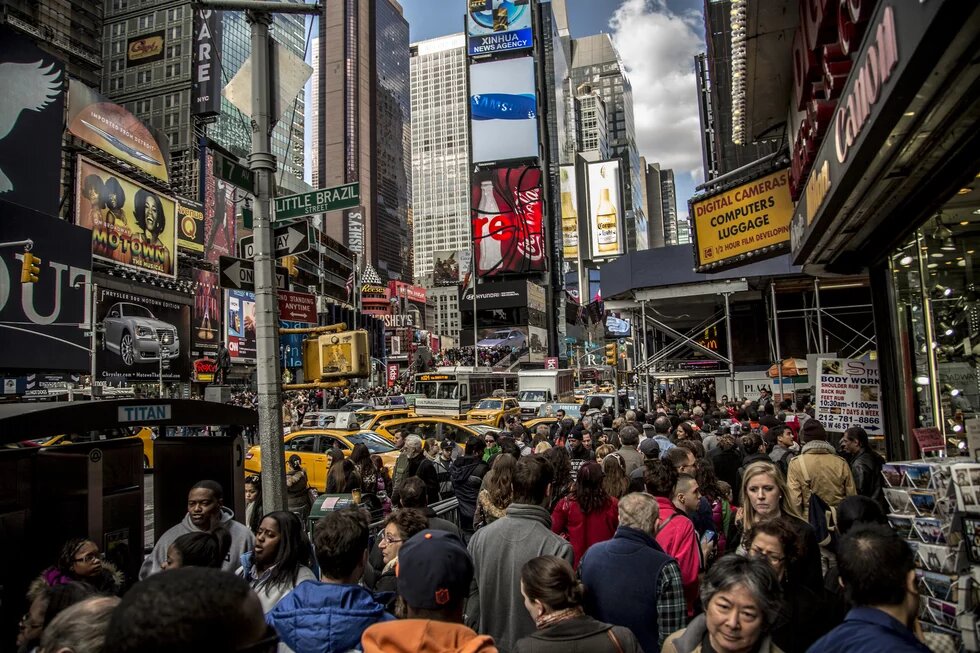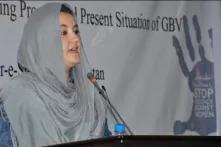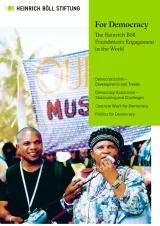
“NGOs at risk – Is India looking to gag independent organizations?”;“Not a word of criticism – New repressions hit Egypt’s civil society”; “Cambodia seeks to restrict civil society through new law”; “Bolivia sacrifices conservation – threats issued to disruptive NGOs”; “Harsher than under Putin: China’s distrust of NGOs”; “Undesirable NGOs forced to abandon Russia”.
This is just a small cross-section of reports on states taking action against non-governmental organizations (NGOs). A disconcerting trend has been perceptible for quite some time. Governments across all continents – irrespective of their form of government – are taking drastic action against civil society actors: against non-governmental organizations, social and ecological activists, women’s rights activists and human rights advocates. The space for actors who are critical of government policies, who call for democracy and human rights, who take an active stand against large-scale projects, and who protest against social injustice, land grabbing and environmental degradation is shrinking. These actors are increasingly the focus of state and private powers and the target of vilification campaigns, repression or criminalization. As a political foundation with its roots firmly planted in the civil societies of our partner countries, we have experienced first-hand how their space is being restricted (shrinking spaces) or how it is becoming virtually impossible for them to carry out their political activities (closing spaces). An independent and critical civil society is not just a thorn in the side of a multitude of governments in Africa, Asia, Latin America and the Middle East; these same governments are fighting civil society to an extent unheard of in the past 25 years.
While we are experiencing this downgrade of civil society’s spaces, the Paris Agreement on Climate as well as the United Nation’s Sustainable Development Goals emphasize NGO’s leading role in monitoring the implementation of the multilateral agreements. This is striking because on the one hand NGOs have in many countries less or even no possibilities to play their role as a watchdog. On the other hand this function is demanded by the head of states in multilateral agreements. If civil society’s leading role is required, head of states need to create a political environment for civil society organizations that is guaranteeing basic rights such as the freedom of expression, to assemble and organize. Otherwise the multilateral agreements lose their credibility. The implementation of the SDGs and the Paris Climate Agreement will need democratic negotiation processes and economic instruments. These processes imply however an independent civil society as well as free media and democratic legitimated parliaments.
Intimidating, vilifying or even banning civil society is nothing new. Many people have been denied the fundamental rights of freedom of assembly, association and speech that are entrenched in the Universal Declaration of Human Rights of 1948, and this denial continues throughout the world even today. But it has recently taken on a whole new dimension: the space granted civil society actors critical of governments to carry out their activities is the subject of more massive curtailment than at any time before, not only by authoritarian or semi-authoritarian regimes but also by democratic governments.
Some of the advances made in democratization in Eastern Europe, Africa and Latin America in the aftermath of the Cold War (“Third Wave Democracy”) have quite simply been reversed. The rights to participation and involvement are being taken away. What is more, an increasing number of nations are jointly embarking on an outright counter-offensive against active citizenship.
Dozens of countries in Africa, Asia, Latin America, Eastern Europe and the Middle East have long since thwarted external democracy promotion – whether governmental or non-governmental. They do this with a veritable bundle of measures: comprising laws, bureaucratic and tax regulations and harassment, smear campaigns in the media, secret service methods and open repression. There appears to be an open season on the types of restriction that are permitted: activists are arrested, bank accounts frozen, threats made, licenses revoked, websites blocked, registrations coerced and offices closed.
Why are governments curtailing the space to act?
Those following this new trend anticipate that it is not a passing phenomenon but has to do with fundamental changes in international politics. The emerging economies in the Global South are accentuating their sovereignty more than ever and perceive all cooperation and international networking between civil society actors as an objectionable intrusion into their domestic affairs. Though their motives and reasons may differ, they all share the common goal of preserving political power and safeguarding the economic interests of the majority of the elites. It is their belief that protests, especially when organized, should be nipped in the bud.
The reasons and causes underlying why the space to act is being curtailed are manifold and intertwined: Western democracy promotion has lost its legitimacy as a whole. On the one hand, money transfers sent from industrial nations for democratization processes are viewed far more critically these days than in the 1990s – above all, when this type of funding benefits not only state but also non-state recipients. The latter have become the focus of attention for those in power. Governments in the Global South strive to maintain or reclaim full control over the flow of external funds. The numerous NGO laws in particular are central to achieving this (see below).
These days, government resistance to external democracy promotion is, above all, justified in its eyes by the country’s “sovereignty” – a key category in international law – that has attained a high emotional importance in many countries as a result of the decolonization struggles. Looked at from this perspective, democratization aid is viewed as an illicit intervention into the internal affairs of another state.
The bugbear of the “color revolutions” and the Arabellion also plays a major role here: “By the mid-2000s (...), democracy promotion had become synonymous for "Western-imposed regime change” . In the aftermath of 11 September 2001 and the war on terror in Afghanistan and Iraq, this stance of opposing any and every form of political influence from the West gained momentum. Military interventions were accompanied by the nimbus of a freedom agenda and democracy promotion. As a result, both democracy and freedom have since suffered an immense loss of credibility, acceptance and legitimacy. The West‘s show of solidarity with the color revolutions in Georgia, Ukraine and Central Asia as well as with the revolutions in the Middle East since 2011 have led to a further renunciation of the West. Another reason for the stiff resistance against civil society activities is the massive increase in political, social and ecological protests and mass mobilization across the globe. Corruption and the abuse of power by the elite have led hundreds of thousands of people to take to the streets, whether in Brazil, Venezuela or Romania. Carothers and Young have counted 60 major protests worldwide “which were often large-scale gatherings of citizens who are determined to challenge fundamental policies or structures of power”.
There has also been a rise in local protests against dams, illegal deforestation and land grabbing as well as against the social and ecological impact of mining and other large-scale infrastructure projects. In today‘s digital era, such local protests can link up with an international audience and political networks faster than ever before and thus gain a visible presence. This is something that the political and economic elites in many countries quite clearly would like to eliminate. They believe their development models and profits to be under threat. The ‘mind your own business’ argument is put forward by governments and, frequently, like-minded media whenever external actors connect politically and financially with social and ecological activists and organizations on the ground. This line of argument is also used by democratic governments (India, Canada, and Australia) as a means of delegitimizing protests against oil pipelines or coalmines and denigrating them as being controlled by external players.
The space in which civil society actors critical of governments are able to act has long since been shrinking due to the passing of numerous laws. Media laws amplify state control over the internet. Over 140 so-called anti-terror laws are not only designed to counter terrorists but, in many cases, also the critical and democratic opposition and civil society that is accused of terrorism. For this reason, it is important to view the entire range of laws in order to comprehend every aspect that curtails the work and activities of civil societies that exercise criticism. With that said, the section that follows will deal exclusively with the latest NGO laws as these are the most prominent means used to cut off the supply of money from international sources to domestic civil society actors.
The new laws governing non-governmental organizations
A veritable boom has broken out in so-called NGO laws governing relations between domestic and foreign NGOs (cash flow, registrations, reporting obligations, etc.). Laws of this nature are unquestionably legitimate. After all, Germany’s regulations of the law of association also determine non-profit status, taxation and the minimum standards for internal procedures (bylaws, elections, accountability, etc.). Transparency and legitimacy are central to the credibility and actions of NGOs; however, not all is well in this context. Independent seals of approval and clear requirements for associations such as those in Germany, among other countries, do not exist everywhere. Moreover, some NGOs in developing countries are wholly on a drip-feed of foreign fund providers. Critical questions as to their legitimacy or their strong base in the respective local communities may rightly be asked in Europe as well as in developing countries. A vast number of critical analyses and publications are available on the subject of the ambivalence, role and capacity of civil society (is it, for example, co-opted or instrumentalized by the state?) which I am not able to address in this paper.
In the context of NGO legislation, the primary aim is to evaluate the extent to which statutory regulations fundamentally question the right of association (a universal right) and respect the independence of organizations or not. What due processes of law are guaranteed when an organization is denied its right of association? In over 60 countries, NGO laws have either been passed or initiated over the past three years that call these principles into question. In its most recent report, CIVICUS, a global organization for citizen participation, pointed to 96 significant restrictions on the rights of civil society in the period between June 2014 and May 2015.
The core concern of the new NGO laws, or older ones that are currently undergoing amendment, is to cut the flow of foreign cash to domestic organizations and/or to have the state control the flow of money. A law passed in Ethiopia in 2009, for example, prohibits all domestic NGOs receiving more than 10% of their budget from abroad from engaging in any form of political activity. In Israel, a law has been presented to parliament that stipulates that all NGOs receiving more than half of their funding from foreign organizations must state this fact on all correspondence and should wear a badge in Israel’s parliament indicating that they receive foreign funding. This shows the ambivalence of the governments concerned: money should continue to flow into the country but then either purely for political causes of interest to the governments or for social or ecological projects with no designs on any form of political engagement whatsoever.
India’s Foreign Contribution Regulation Act (FCRA) grants NGOs receiving money from abroad a “license” that dictates that ultimately no political activities may be funded with that money. For some time, India’s authorities have intensified their efforts to check whether the various legislative requirements are being observed. Among the most prominent victims of the intensified checks conducted by India’s government is Greenpeace India: the organization’s FCRA license has been revoked.
Administrative requirements
The specific means of restricting space and of intimidation include the registration rules and the regulations governing reporting obligations. Russia’s NGO law has gained notoriety and found its emulators (e.g. in Malaysia and in the Israeli bill). Those receiving money from abroad must be registered as a “foreign agent”. The term “agent” is not only used in NGO laws. Denoting critical minds and actors as “Western agents” has been a popular tactic in vilification campaigns whether in Venezuela, Malaysia, Ecuador or Russia.
A large number of countries also require actors receiving foreign funding as well as foreign organizations operating within their countries to disclose their envisaged activities and to seek approval (Algeria, Ethiopia, Jordan, Nepal, and Turkmenistan) or that any funding flow to through state channels from the outset. These restrictions are further aggravated by reporting obligations that are harassing in nature and not guided by any legitimate interest in transparency or accountability (Indonesia, India, and Bangladesh).
In China, the new law governing the regulation of NGOs stipulates that sovereignty will rest with the Ministry of Public Security – which is also responsible for the registration of Chinese NGOs – and not with the Ministry of Civil Affairs. Cambodia rushed an NGO law through parliament in the summer of 2015 which forbids all activities that endanger the peace, stability, public order, culture or traditions of the country.
This wording is characteristic of virtually every new NGO law. In addition to restricting or banning political activity, these laws prescribe that NGOs may not oppose “public order and security” or violate national interests. This use of specifically loose wording opens the floodgates for interpretation and thus arbitrary government. In many countries, national security and the war on terror are used as a pretense to gag or ban democratic organizations. This general suspicion has taken on an extreme form in Egypt: here, there is virtually no space for any form of even reasonably critical civil society initiatives or media reporting. Many human rights activists view the situation there today as being worse than under the regime of Hosni Mubarak, which, at least, left grey areas and space for human rights activists and other critical minds.
Threats, imprisonment and censorship used to silence critical voices
In autocratic countries, the primary goal is to nip any form of association and public protest in the bud. NGO laws are not the only legislative measures that restrict civil society’s space: home security laws, anti-terrorism laws, media laws – all of these entail restrictions on the capacity to act for civil society actors, social movements, journalists, lawyers, bloggers and critical professional associations.
In democratic or partially democratic countries, we can observe that, increasingly, a plethora of legal, administrative and repressive measures undertaken by governments primarily target social movements and NGOs that stand up to large-scale projects (such as developing coal, oil or gas reserves), and also to land grabbing or other infrastructure projects. China, Russia, India, Ethiopia, Turkey or Cambodia are not alone in exerting pressure on environmentalists as members of civil society. Wherever strategic, natural resources – coal, oil, gas, water, forests, land, and biodiversity – are exploited, or access to them is controlled, those in power resort to strategies in order to safeguard their power and preserve their business model.
In a report published on 10 June 2015, Maina Kiai, Special Rapporteur on the rights to freedom of peaceful assembly and of association, stated: “Increased demand for resources has resulted in the opening up of more areas for exploration and exploitation, especially in populated areas, leading to conflict between competing interests. By some accounts, between 93 and 99 per cent of 73 000 mining, logging, agriculture, oil and gas concessions in eight tropical forested countries were inhabited. The same sources indicate that, for example, up to 40 per cent of the territory of Peru has been handed over by the Government to private for-profit entities to exploit natural resources and that in Liberia and in Indonesia 35 and 30 percent, respectively, of the land is in the hands of the private sector for exploitation operations. The existence of widespread social conflict associated with natural resource exploitation is therefore not surprising. For example, in Peru, the Ombudsman’s Office documented 211 social conflicts in the month of February 2015, 66 percent of which were related to natural resource exploitation. In Colombia, the Ombudsman’s Office participated in 218 dialogues between mining companies, protestors and the Government.”
Beyond the human rights violations committed in developing countries, Maina Kiai also cites similar violations in Canada and Australia in connection with the exploration of raw materials. The murdering of activists (above all those engaged in local resistance) is also becoming more prevalent. According to a British NGO, Global Witness, the number of environmentalists killed is steadily increasing. In 2014, there were 116 killings worldwide – which equates to approximately two deaths per week. The most dangerous country for environmentalists is Honduras with 101 deaths between 2010 and 2014. And these are only the recorded cases. The number of unreported deaths is most likely far higher as the murders are frequently committed in remote areas. The targeted victims are those that challenge power and control structures, disclose corruption and injustice, and refuse to be dragged into the industry’s voluntary initiatives but instead seek to uncover and prevent their political influence.
That lesbians, gays, bisexuals, transgender and intersex people (LGBTIs) are threatened is nothing new. Numerous reports are available outlining how the work undertaken by LGBTIs and LGBTI activists is being curtailed, which I am unable to address in this paper. The arguments put forward follow a familiar pattern, however: LGBTI rights, so the argument goes, are Western values that destroy the image of the family as well as the culture in one’s own country. LGBTI and LGBTI activists are therefore deemed enemies of the state. Newspapers blacklist their names. This practice regrettably also applies to EU member states such as Hungary. LGBTI rights are massively curtailed in Armenia, Serbia, Russia, Uganda and Turkey, to name but a few.
Activists are not the only group to be targeted: lawyers and journalists are equally restricted in their work, censored and threatened. The latest report published by Reporters Without Borders depicts the brutality exercised even against environmental journalists and notes that acts of violence are rising year on year. At least ten environmental journalists have been killed since 2010. They were from India, Cambodia, the Philippines, Indonesia and Russia. In 2015 alone, two reporters were brutally killed in India: both journalists had been reporting on illegal mining and uncovered acts of corruption. They were kidnapped and burned to death.
In many countries, it is a matter of both – of repelling any entitlement to democratic participation and protests against the “development model” so as not to endanger the political and economic power of the elites. Governmental fear of citizens’ participation and protest is immense. The loss of political power is the major threat. All too often, defending this power goes hand in hand with the safeguarding of economic interests. Here, protests against land grabbing and large-scale projects are “unwelcome”.
Funding from abroad is used as a pretense and stokes specifically nationalistic resentment designed to distract from these interests. Garcia Linera, Bolivia’s Vice President, denounced domestic think tanks and NGOs as being representatives of the “imperial environmental discourse”. The revocation of Greenpeace India’s license is interpreted as a declaration of war on the part of India’s government against all those who oppose the Indian development and growth model. Isolating national activists from external cash flows and digital connections is one thing; prosecuting and subjecting them to intelligence surveillance in their own country another: these two combined not only lead to shrinking spaces for NGOs but can even shut them down completely.
In some of our partner countries, this strategy has long since proven to be successful. In Russia, the vast majority of human rights activists have been robbed of their primary sources of funding. Many NGOs – whether in Kenya or India – are already disbanding. The critical minds are going into exile (Ethiopia, Egypt). Those partnered with NGOs or foundations are withdrawing for fear of being harassed or criminalized (China). The political climate has taken a dramatic turn for the worse for NGOs and social movements in numerous countries. Their denunciation as agents of the West or as neo-colonists is ensnarled in a context in which the nationalistic card is part of securing power.
|
Repression and new laws are designed to gag every critical voice raised against government action. Civil society engagement remains permitted nonetheless, provided that it is non-political and continues to perform state tasks, for example, within the social and environmental sectors without laying any claim to democratic participation or tackling the structural root causes underlying poverty. Depoliticized NGOs are desirable – they may also accept money from abroad, though admittedly under increased state supervision. The process of compartmentalizing NGOs into good and bad or enemies of the state is in full flow, and the many new NGO laws provide the legal basis for this ongoing process.
State and non-state sponsors of civil societies and democratization processes must come up with an answer especially to this intentionally sought division between desired and undesired civil society. A discussion, whilst tentative, has now begun as to how private and state funders of civil societies should respond to the latest challenges posed by “shrinking and closing spaces”. Thomas Carothers has attempted to summarize these in his latest publication which appeared in November.
Sounding out the political space for action in a difficult environment is just one of the core activities of a political foundation. The number of strategies available to international organizations here is few and far between given such an environment. Weighing these requires having a sure instinct and responsible gauging, above all, as to whether and how the safety of the cooperation partners and staff is ensured. This can sometimes mean remaining in the country, “hibernating” there in order to support and assist civil society actors for as long as possible and hoping that the space will widen again. Being present in a country can mean that the room for discussion with partners can be held open, and can sometimes prevent partners from having to end their activities immediately or being arrested. Staying in a country can also lead to organizations restricting themselves to non-political topics and having to rescind political visibility.
Completely withdrawing from a country is another option. It is for this reason that the Heinrich Böll Foundation withdrew from Ethiopia towards the end of 2012. The space for our partners and ourselves to engage in political activity was bordering on zero. The freedom of press, speech and association had become dramatically restricted there over the past few years. The passing of laws on the role and functions of NGOs in 2009 as well as the implementation regulations of autumn 2011 reached new heights in political control and restrictions on the freedom to act.
|
That people campaigning for human rights and rule of law as well as LGBTI rights and for an economic policy geared towards social and ecological justice are pursued by those in power is nothing new. What is new, however, is the massive and shameless way in which they seek to counteract it – a development that will endure and may even worsen. Therefore, the massive restrictions placed on the space afforded to civil society organizations must be put on the political agenda. Freedom of speech, organization and association are the essence of any democracy. Their restriction must challenge all democratic governments and global cooperation.
On these grounds, this issue must be put on the foreign and development policy as well as the human rights agenda, be taken up by governments, and be integrated into global inter-governmental discussions and negotiation.
Literature
- Act Alliance (2011): Shrinking political space of civil society action. ACT Alliance Development Effectiveness Working Group and ACT Alliance Rights and Development Working Group
- Adloff, Frank (2005): Zivilgesellschaft. Theorie und politische Praxis. Campus Verlag.
- Brown, David (2009): Creating Credibility – Legitimacy and Accountability for Transnational Civil Society
- Brunnengräber, Achim; Klein, Ansgar; Walk, Heike (2009): NGOs im Prozess der Globalisierung. Mächtige Zwerge – umstrittene Riesen. VS Verlag für Sozialwissenschaften.
- Carothers, Thomas; Youngs, Richard (2015): The Complexities of Global Protests. Carnegie Endowment for International Peace.
- Carothers, Thomas (2015): The closing Space Challenge - How are Funders responding? Carnegie Endowment for international Peace.
- Carothers, Thomas; Brechemacher, Saskia (2014): Closing Space: Democracy and Human Rights Support under Fire. Carnegie Endowment for International Peace.
- CIVICUS (2015): State of Civil Society Report. World Alliance for Citizen Participation.
- Davies, Thomas Richard (2006): The Rise and Fall of Transnational Civil Society.
- Drinhausen, Katja; Schucher, Günther (2015): Zivilgesellschaft unter Druck: Globaler Widerstand gegen Demokratie wächst. German Institute for Global and Area Studies.
- Dupuy, K; Ron, J.; Prakash A. (2014): Who survived? Ethiopia’s regulatory crackdown on foreign-funded NGOs. Review of International Political Economy.
- Forst, Michael (Oktober 2015): Promotion and protection of human rights: human rights questions, including alternative approaches for improving the effective enjoyment of human rights and fundamental freedoms, Bericht an die UN-Generalversammlung, A/70/217.
- Global Witness (2015): How many more? 2014’s deadly environment: the killing and intimidation of environmental and land activists, with a spotlight on Honduras. Global Witness.
- Gnärig, Burkhard (2015): The Hedgehog and the Beetle. Disruption and Innovation in the Civil Society Sector. International Civil Society Centre.
- Gosewinkel, Dieter; Reichardt, Sven (2004): Ambivalenzen der Zivilgesellschaft. Gegenbegriffe, Gewalt und Macht. WZB.
- Heidel, Klaus (2009): Von der Notwendigkeit neuer Formen zivilgesellschaftlichen Engagements. Sechs Thesen. In: Social Watch Deutschland/Forum Weltsozialgipfel: Globale Krisen. Soziale Auswirkungen – Politische Konsequenzen
- Heinrich-Böll-Foundation (2012): Zur Schließung des Büros der Heinrich-Böll-Stiftung in Äthiopien. (last downloaded 05.01.16).
- Heins, Volker (1992): Ambivalenzen der Zivilgesellschaft. Politische Vierteljahresschrift, Vol. 33.
- ILGA Europe (2015): Promoting and Enabling Civil Society Environment. Understanding the concept, policy and environment and its linkages with LGBTI civil society protected rights. Working Paper 1/2315.
- ILGA (2015): State Sponsored Homophobia. A World Survey of Laws: criminalization, protection and recognition of same-sex love. Carroll, Aengus, Itaborahy, Lucas P.
- Kiai, Maina (2015): Promotion and protection of all human rights, civil, political, economic, social and cultural rights, including the right to development. United Nations General Assembly. Report A/HCR/29/25.
- Kiai, Maina (August 2015): Comparing States’ treatment of businesses and associations worldwide. Bericht an die UN-Generalversammlung, A/70/266.
- Kiai, Maina (April 2015): Threats against groups most at risk when exercising assembly and association rights. Bericht an den UN-Menschenrechtsrat, A/HRC/26/29.
- Kiai, Maina (September 2014): Multilateral institutions and their effect on assembly and association rights, Bericht an die UN-Generalversammlung, A/69/365.
- Kiai, Maina (August 2013): The rights to freedom of peaceful assembly and of association in the context of elections. Bericht an die UN-Generalversammlung, A/68/299.
- Library of Congress (2014): Laws on Homosexuality in African Nations. Global Legal Research Center.
- Nuscheler, Franz (1998): NGOs in Weltgesellschaft und Weltpolitik: Menschenrechtsorganisationen als Sauerteig einer besseren Welt?
- Nuscheler, Franz (2008): Die umstrittene Wirksamkeit der Entwicklungszusammenarbeit. INEF-Report 93.
- Rutzen, Douglas (2015): Civil Society under Assault. National Endowment for Democracy and John Hopkins University Press.
- Reporters Without Borders (2015): Hostile Climate For Environmental Journalists. Report 2015.
- Unmüßig, Barbara (2011): NGOs in der Klimakrise. Fragmentierungsprozesse, Konfliktlinien und strategische Ansätze
- Unmüßig, Barbara (2015): Die Rolle der Zivilgesellschaft in der Klimapolitik. GAIA 24/3.



